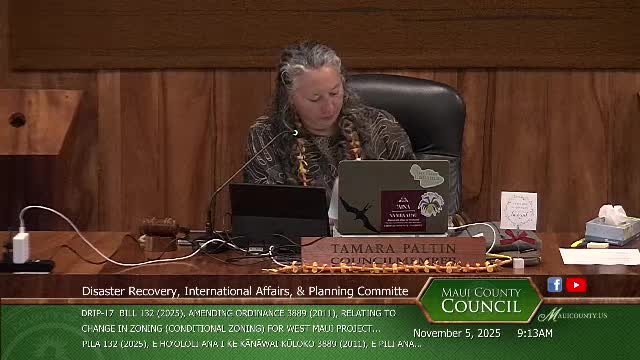Maui committee advances Pulelehua zoning amendment amid water and wage concerns
Get AI-powered insights, summaries, and transcripts
Subscribe
Summary
The Maui County Council disaster recovery and planning committee on Nov. 5 recommended first reading of a substitute version of Bill 132 (2025), an amendment to conditional zoning for the West Maui Project District 5 (Pulelehua), after debate over water availability, developer obligations and prevailing‑wage questions.
The Maui County Council Disaster Recovery, International Affairs and Planning (DRIP) Committee on Nov. 5 voted 7–1 to recommend first reading of Bill 132 (CD1), a zoning amendment for West Maui Project District 5 (Pulelehua), after substituting the original bill for a staff‑recommended CD1 version.
The bill as amended would revise Condition 2 of Ordinance 3889 (2011) — the condition that requires the developer to provide potable and nonpotable water source, storage and transmission improvements — so that the project may avail itself of any exemption under Maui County Code (MCC) chapter 14.12 for which it qualifies. The Planning Commission had recommended amending rather than deleting Condition 2 and recommended denying repeal of Condition 15 (the 50‑acre park condition), which staff said appears to have been completed but is retained in the record.
Committee members and staff said the amendment is intended to enable the project to seek subdivision approval and civil permits under existing MCC exemptions for qualifying affordable housing projects even while long‑term county water service remains constrained. Staff estimated the bill could enable an allocation of about 75,000 gallons per day — an amount staff said could support roughly 240 affordable homes in early phases — but stressed that allocation from the county system is not automatic and depends on available reliable supply.
Developer Paul Chang, identified as a resource for the meeting, told the committee the project has ownership entitlements and that after the wildfires his team revised phase 1 to be 100% affordable (240 units). He said two wells have been drilled and water tests were “clean,” and that a reverse‑osmosis system would be used to treat the supply to potable standards. Chang said prior will‑serve arrangements tied to ditch water were undermined by new in‑stream flow standards and drought, and that the project has spent private funds on engineering and site grading while pursuing permits and financing, including HUD involvement.
Multiple public testifiers urged caution and changes. An anonymous testifier questioned the developer’s motives and urged deed restrictions to guarantee affordability in perpetuity rather than time‑limited affordability; members of the Royal House of Hawaii raised concerns about historic land titles; and community speakers pressed for prioritizing Hawaiian Home Lands (DHHL) beneficiaries and for perpetual affordability if public funds or tax breaks are used. One testifier proposed atmospheric water generators as a supplemental technology option.
Members pressed the developer about outstanding funding and labor issues. Council members raised prevailing‑wage concerns, noting that public‑funded public works generally trigger prevailing‑wage obligations; some members asked the developer and staff to document whether any reimbursed or grant funds were used in ways that create retroactive wage obligations. Chang said the developer had not spent the bulk of previously appropriated grant funds (he said roughly 98% remained unspent and a small portion was used for engineering) and that he would pay prevailing wages where public funds require it.
Planning staff and the Department of Water Supply (DWS) cautioned that qualifying for a chapter 14.12 exemption (which can cover 100% affordable projects or projects by qualified housing providers) would allow subdivision approval without the written verification of a long‑term reliable supply under some circumstances but does not automatically make county water service available. A DWS representative said the department remains at or near reliable capacity and must prioritize water needed for Lahaina town reconstruction; DWS said it does not object to the amended condition language but emphasized the exemption does not change the county’s physical water capacity constraints.
After discussion, the committee first moved to substitute the bill with the proposed CD1 (attachment 4). The substitution passed on roll call 7–1 (one member recorded “no”). The committee then voted on the main motion to recommend passage of Bill 132 (CD1) on first reading; that motion also passed on roll call 7–1. The chair announced the item concluded and the meeting adjourned.
The committee asked county staff to follow up on several items raised in testimony and discussion, including (1) clarifying which exemptions under MCC 14.12, subsections (e) and (f), apply to this project and whether the project qualifies as a “qualified housing provider,” (2) any pending Department of Labor findings or outstanding prevailing‑wage obligations tied to the project grants or reimbursements, and (3) administrative coordination on temporary water use permits and any county role in interim supply while wells and treatment are finalized. The planning director’s written clarification of the Planning Commission minutes was entered into the record during the meeting.
Votes recorded during the meeting appear in the committee minutes. The committee did not adopt final zoning changes at this meeting; it recommended first reading of the CD1 version for the full council to consider in a future session.
